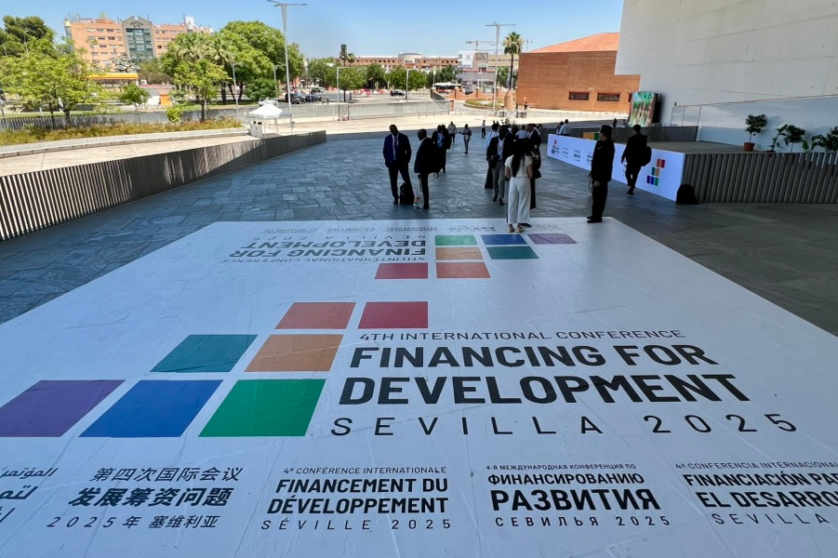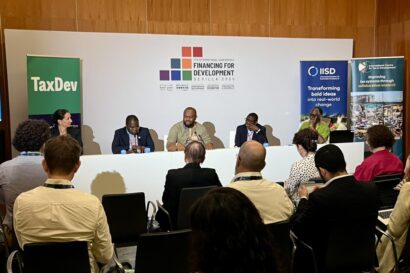The 4th International Financing for Development Conference concluded last week in Seville, with the focus now moving from the final outcome document, the Compromiso de Sevilla, to implementation and the Seville Platform for Action (SPA), which brings together more than 130 initiatives aiming to deliver on the commitments set out in the Compromiso.
Domestic resource mobilisation and tax reform high on the agenda
Domestic resource mobilisation (DRM) was a core issue on the agenda at FfD4, all the more pertinent for lower-income countries in the current climate of declining aid and unprecedented debt levels. Governments are under enormous fiscal pressure to raise revenue but approaching this without investing in tax capacity or drawing on evidence for what works (and what doesn’t) risks undermining their efforts and straining citizen trust.
A contingent from the International Centre for Tax and Development (ICTD) was present at FfD4 to discuss how research collaboration contributes to evidence-based tax policy. Speaking at a number of other FfD4 side events and in media interviews, ICTD Executive Director Giulia Mascagni highlighted how the world is entering a new “tax era of development”. While tax is already the main source of development finance, lower-income countries still work on less than half the revenue, as a share of GDP, of their higher-income counterparts. If done right, tax can also help develop stronger public institutions and create the right environment for investment, growth and entrepreneurship.
ICTD, based at the Institute of Development Studies (IDS), was one of a coalition of five organisations which launched an SPA initiative at FfD4 focused on the reform of tax expenditures. Tax expenditures refer to tax holidays, incentives and exemptions and represent foregone revenue and an estimated 4 per cent of global GDP around a quarter of all tax revenues. Most of these tax expenditures are untracked, unevaluated, and underreported, continuing without clear evidence of impact. This creates a major fiscal drain, leaving fewer resources for infrastructure, health, education, climate action, and other development priorities. The initiative has already been endorsed by Brazil, France, Guinea, Nigeria, Rwanda, Senegal, Spain, and the United Kingdom.
Beyond tax, FfD4 set the wheels in motion for discussing financing around a number of critical areas for development over the next decade including climate, health, social protection and trade.
Reflections from our experts on next steps
On Tax
Giulia Mascagni, Executive Director, ICTD said:
“Tax emerged as a central issue in the FFD4 conference, against the backdrop of declining aid and soaring debt costs. We are firmly in a new era – the tax era of development – in which tax is not only the main source of financing but also the lynchpin of development finance and the key for more resilient states and strong economies. But this new tax era is about more than just increases in revenue: it is about tax equity, taxing the wealthy, and fair global tax rules and processes. In the lead up to the conference, ICTD submitted suggestions for language to feed into the final outcome document on informality and the imperative to protect lower-income earners, health taxes, tax expenditures, and strategies to tax the wealthy by enforcing existing legislation more effectively.
“Research can help identify the best opportunities of reform that increase revenue and improve equity at the same time. I heard several practical examples at the conference of how research insights translated into better policymaking. I was particularly pleased to see that the Compromiso de Sevilla includes a commitment to double aid for tax – this new era will be most successful with continued international partnership and support. There was widespread recognition at the conference that the next decade of action on tax and development will have a strong focus on getting the basics right: strengthening national tax administrations and building up their capacity. Now it is time to move from negotiations to action.”
On debt
Max Gallien, Research Fellow, ICTD and Research Fellow, IDS said:
“How to tackle the sovereign debt crisis burdening many lower-income countries was one of the most controversial and emotive topics in Seville. The UNCTAD estimate that 3.4 billion people are currently living in countries that spend more on servicing debt than on health or education was perhaps the most repeated statistic of the conference. In this respect, the Compromiso de Sevilla has been perhaps the most disappointing.
“Many civil society organisations and governments from lower-income countries had hoped for more ambitious language on debt architecture reform, especially with reference to a UN Framework Convention on Sovereign Debt. The disappointment here was audible, at times literally – on the morning of the final day of the conference, a protest in the lobby of one of the conference buildings sought to remind the delegates in the various side events of the importance of putting debt justice at the heart of the financing for development agenda. The pressure for this will surely not let up, both through civil society but also the sheer magnitude of the debt servicing burdens that many countries continue to face.”
On the role of development banks
Stephany Griffith-Jones, Emeritus Professorial Fellow, IDS said:
I think the “Compromiso de Sevilla” agreed at the FFD4 Conference brought much needed hope to emerging and developing countries. One of the central issues highlighted in the agreed Compromiso was the key role that public development banks (PDBs), at a multilateral, regional and national level, do and can further play in financing for development. Indeed, one could say that PDBs were placed at the heart of the agreement reached in Sevilla. Currently total PDBs worldwide have US $ 23 trillion of assets, financing about 10% of global investment. In Sevilla, an agreement was reached to attempt to triple financing of MDBs. Furthermore, the key role of national development banks was also especially highlighted. It was recognised that development banks can play an important role in helping developing countries to progress on sustainable and inclusive development. They both can deliver public funds as well as a clear directionality to financing investment for development , whilst helping catalyse and mobilise significant private finance to help achieve such development.
On financing for health
Gerald Bloom, Research Fellow, IDS said:
“In the short-term it will be important to minimise the impact on health and access to essential health services of the very rapid reduction of financial support by the United States. As health services are increasingly financed from local sources, more international attention will be needed to ensure that safe and effective drugs and diagnostic equipment are available at a reasonable cost.
“There will be a need for continuing international funding of some key services that are essential to global health, such as effective prevention and response to potential pandemics. In that case, it will be important for international funders to align their support with national health sector strategies.”
On trade and tariffs
Amrita Saha, Research Fellow, IDS said:
“In the backdrop of rising tensions and tariffs, it was promising to see the FFD4 conference emphasising the role of trade and multilateralism for development as a central area of action. The pledge to double support for developing countries’ trade-related capacity building by 2030 as part of the “Compromiso de Sevilla” is very positive.
“The distributional effects of ongoing trade shocks will depend heavily on the costs of adjustment that will be unevenly spread across people according to their skills and ability to move into other industries and segments-consequently, worsening economic and socio-economic inequalities. And many low- and middle-income economies continue to face severe infrastructure deficiencies and challenges in effectively participating in trade negotiations, which means that the poor and disadvantaged may be unable to reap the full benefits of trade related interventions that would otherwise be available.
“Hence, addressing trade-related challenges through different mechanism of aid and financing for sustainable development remains highly relevant. Going forward, we can expect to see the implementation of paired trade and development cooperation measures, as well as efforts towards harnessing the positive linkages between trade and the broader climate and development agendas.”
Take action
- Hear from our FfD4 policy engagement lead
- Watch the media interview with ICTD Executive Director
- Download ICTD Tax Era for Development policy brief
- Sign up to attend Sri Lanka event on sovereign debt
- Read this interview by WIEGO with Gallien about ICTD’s engagement with the FfD4 process
This story was first published in the IDS website.



